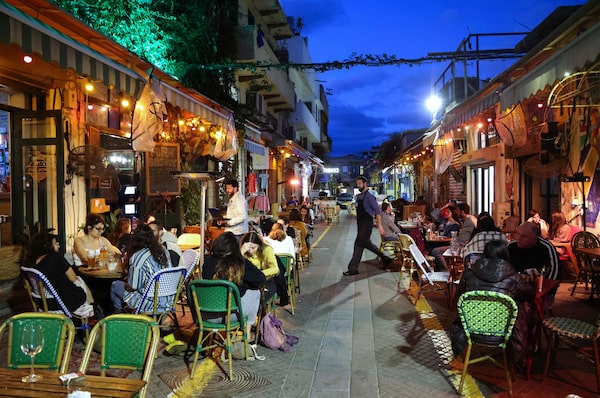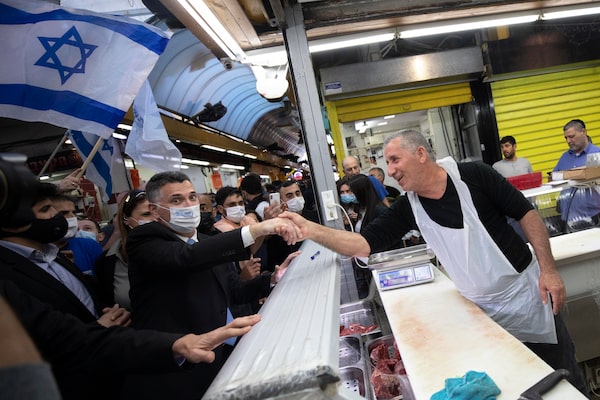
Israelis dine out on March 7 in Tel Aviv, where the 'Green Pass' system introduced last month has allowed vaccinated people to enjoy some of the Mediterranean beach city's usual diversions.EMMANUEL DUNAND/AFP via Getty Images
A recent Thursday night in Tel Aviv feels like a glimpse into the future – and perhaps a reminder of what life was like before the pandemic. A group of twentysomething men are sitting at an outdoor table at a bar in Dizengoff Square in central Tel Aviv, to celebrate their friend’s engagement.
In this city on the Mediterranean beach – a nightlife hub before the pandemic – lines of young people pour out onto the streets, drinking from glass beer bottles as they wait for a table outside popular bars and restaurants.
“It gives me goosebumps,” reveler Nil Elner says, yelling above the music. “It’s been like a jail, but now we can finally go out.”
Israel’s rapid vaccination campaign kicked off in December and more than 5.1 million of its 9.3 million residents have already received at least one dose.
The Green Pass system, launched last month, is encouraging everyone to accept the shot. Green Pass holders, who have been fully vaccinated or recovered from the virus, can enter gyms, hotels, pools and other indoor facilities. The certificate, which can be downloaded through a phone app, has a barcode that can be scanned at entrances and is valid for six months, starting one week after the second dose of the vaccine.
For the service industry, the Green Pass is a game-changer. Restaurants and bars can resume indoor service with distance between tables. Those without a Green Pass can sit only outdoors. But while the streets of the city are infused with euphoria, bar and restaurant owners say they foresee a long road to full reopening.
Dror Alterovich pours a drink at The Imperial in Tel Aviv on March 19 while the bar is closed.Emily Rose/The Globe and Mail
It’s Friday night and Dror Alterovich, owner of upscale cocktail bar The Imperial, is sitting at an empty booth crunching numbers on his laptop. The bar is closed for the weekend. “We are short-staffed,” he says, explaining he can only open four nights a week.
During the crisis, the Israeli government started paying 60 per cent to 70 per cent in unemployment benefits for those who lost their jobs. The payments are slated to continue until June but could be extended. “At the moment, they’ve got it made,” says Tomer Moore, CEO of the Restaurateurs Stronger Together Association. “They are living at their parents’, getting money from the government and studying via Zoom, so it’s like they won the lottery for this year – we call it the ‘Israeli government summer camp.’ ”
“It’s like we are in competition for employment with the government,” says Alon Fridman, co-owner of Onza, a popular restaurant in Jaffa’s flea market.
Mr. Fridman’s business partner, Sharon Sapir, is waiting tables herself while she manages the bartenders and trains new staff. Many bar and restaurant owners have resorted to working shifts themselves to keep up with demand.

Onza is a popular restaurant in the flea market of Jaffa, a historic port district of Tel Aviv. Onza co-owner Sharon Sapir, right, waits tables as she manages and trains new servers.Emily Rose/The Globe and Mail

Israelis dance in a Tel Aviv restaurant's backyard at a March 19 party celebrating the Persian new year, which was broadcast live on the Iran International TV channel.Oded Balilty/The Associated Press

Green Passes are a necessity for Tel Aviv residents who want to get into concert venues, like the one at left, or restaurants, at right.Amir Levy/AFP/Getty Images
The Israeli Restaurateurs Stronger Together Association estimates that 80,000 of the roughly 200,000 employees who worked in the service industry before the crisis were students. According to the association, 80 per cent of those students have not returned to work amid the pandemic.
While the Tel Aviv municipality had predicted that the pandemic would cause young people to leave the city, the opposite occurred. More young people moved to Tel Aviv, expanding demand for nightlife.
But the students are not returning to the arduous jobs that had been supporting them before the pandemic.
The city of Tel Aviv is supporting businesses by allowing restaurants to expand their outdoor seating space on sidewalks and streets around eateries.
The municipality also paused vehicle traffic on some streets so they can be used for outdoor dining and stopped charging rent to establishments on municipal property.
Lior Shapira, chair of Tel Aviv City Council, says municipal officials have been going door to door, asking businesses what else they need to reopen, but he believes that the worker shortage is the major issue and won’t be solved until after the coming national elections.

Israeli politician Gideon Saar shakes hands with a vendor at a Tel Aviv market on March 17.Sebastian Scheiner/The Associated Press
Restaurant owners who decide to reopen say that, in many ways, it’s like starting from scratch – and new guidelines, such as spacing between tables, make it hard for them to earn enough revenue.
About 20 per cent of Israeli restaurants closed during the crisis and won’t reopen, according to Uriel Lynn, president of the Israeli Chamber of Commerce.
“For them, the crisis was very difficult,” Mr. Lynn says, explaining that many businesses also underwent structural changes, eliminating certain positions that also may never return.
Tomer Moore, CEO of the restaurateurs association, estimates it will take three to five years for the industry to recover completely.
Diners enjoy their Thursday night out at Louis bar in Tel Aviv.Emily Rose/The Globe and Mail
Our Morning Update and Evening Update newsletters are written by Globe editors, giving you a concise summary of the day’s most important headlines. Sign up today.